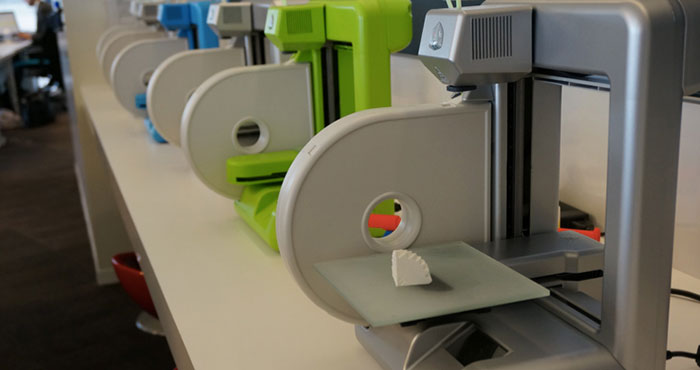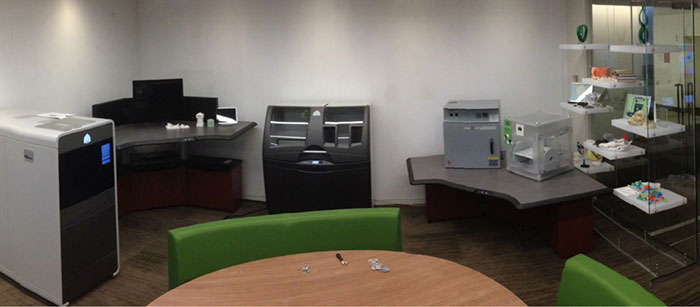When a company like Deloitte dedicates an entire “Discovery Centre” to you, you know you are big. That is true whether you are a multinational company, an investment fund or even a Nation, since Deloitte Touche Tohmatsu Limited, is the largest professional and financial advisory service network in the world and its evaluations can deeply affect entire national economies. So, imagine the impact that Deloitte can have on a rapidly emerging market trend such as that of 3D printing and additive manufacturing (AM).
The New York based company, which by itself registers yearly revenues for over 30 billion dollars, is a leader in manufacturing consulting services as well. It has now formed a partnership with 3D Systems, a leading producer of industrial 3D printers, to establish a “3D Printing Greenhouse Discovery Center” at its offices in Rosslyn, VA, near Washington D.C. Its intent is to help companies keep up with the pace of change in design and manufacturing which, it says, is now accelerating at an exponential rate, through new human-to-computer interfaces and AM technologies.
“There are a series of emerging technologies that are driving exponential change across sectors — one of the largest being 3D printing,” said Tom Marriott, Principal Consumer and Industrial Product Leader at Deloitte Consulting LLP. “With Deloitte’s cross-functional expertise and 3D Systems’ portfolio of technologies we believe we can help clients accelerate up the learning curve to deploy this technology to meet tomorrow’s largest business challenges,” he added.
What this means is that any manufacturer who is interested in introducing 3D printing processes — for rapid prototyping or manufacturing — to its business model will be able to visit Deloitte Consulting’s centre in Virginia and view a broad range of 3D Systems machines up close and at work. Working closely with their customers, Deloitte’s experts will detail how each specific technology can fit into a specific manufacturing sector, anticipating the broad transformational impact AM would have on a specific company. 3D Systems is a perfect partner as it offers a broad range of 3D printers and 3D printing processes, both at an industrial and consumer level, including many different materials, from plastics and ceramic to resins and some metals.
If a company executive wishes to focus on experiential learning, the consulting session can be tailored to feature a business-relevant closed loop demonstration, where products can be designed and manufactured on-site during a day long experience that will highlight where the benefits, in terms of cost and time reduction in prototyping offered by AM, will become apparent. There is little argument against the direct benefits of rapid prototyping, so the wider adoption of these technologies is limited only by the manufacturing industry’s knowledge of what they are and how they work. Deloitte’s centre will likely contribute to change that, as more, similar initiatives are probably going to follow.
“We believe clients looking towards advanced design and additive manufacturing require a truly immersive experience in order to fully understand the implications to their business,” said Marcus Shingles, Principal Deloitte Consulting Innovation. “Through this Centre, clients can experience the end to end process before they commit to further investment.”
While Deloitte cannot release information on specific clients it has already been successfully working with companies through its Greenhouse Discovery Centre. This is quite relevant as Deloitte’s clients include over 75% of the Global Fortune 500. Deloitte’s AM support program is articulated in three main Paths. The first is focused on illustrating how all performance enhancing efforts deliver value by improving profitability, through cost reduction and by accelerating the business cycle (with faster deliverance of cash flows). This is achieved through 3d printing’s ability to streamline and accelerate the design process, with reduced costs and time-to-market, along with improved product quality.
The second Path concerns the supply chain, which can be radically altered by exploiting 3D printing’s ability to significantly reduce minimum efficient scale in production locations and reduce working capital requirements. This means that companies at all levels, from military surgery to business-to-consumer delivery and on-demand printing at local sites, can benefit from the possibility of producing a reduced, specific number of minimum quantities while still offering profit margins. Deloitte’s view is that in the long run such shifts in the supply chain structure may represent a key growth vector, as many different firms try to capitalize on the ability to deliver faster, cheaper and more precisely than competitors.
The evolution of products is the third Path Deloitte is focusing on and is based on 3D printing’s capability to allow for the creation of physical products that cannot be manufactured by other means. This is probably one of the most delicate aspects, and probably that which most required the creation of the actual centre in Rosslyn because, as we have seen in the past, it is sometimes very complex to properly convey the value of a 3D printed product, which, in the end, is still highly limited by the materials available for use. This is already changing at industry level, as complex multi-component, multi-material prototypes can now be output in a single additive manufacturing session. AM’s product output will evolve even more rapidly in the future, as technologies to 3D print embedded sensors, electronics, biological tissue and advanced high-performance designs are developed.
All these paths combine in the “pursuit of business model innovation” — Path four. This outline sees AM as the natural evolution of the personalization, sharing and collaborative creation made possible by the growth of the Internet, cloud computing and social media. This means that companies can adopt AM to interact more closely with their customers in the design process. Currently the advantages of this approach are particularly evident in the development of new generation, personalized and tailor made medical and health care supports and products. However, in the future, this type of interaction between product manufacturers and product adopters will become more common and demanded.
Deloitte’s conclusion is that these new business paradigms afforded by the implementation of AM are not going away any time soon. This means that now is the time for manufacturers to discover it, or run the risk of being left inexorably behind.




